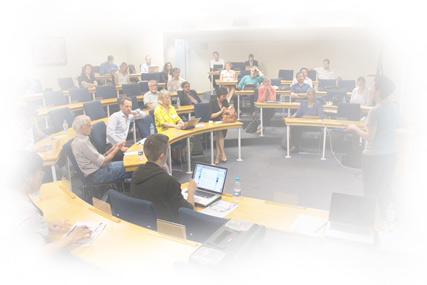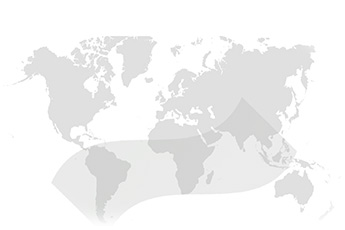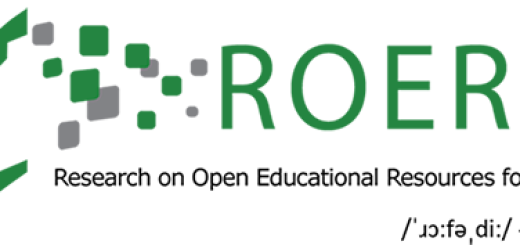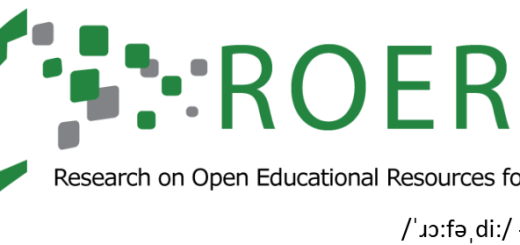ROER4D roundtable presentation at OpenEd 17. Photo provided by Sukaina Walji under a CC BY licence.
While the official theme of OpenEd 17 was ‘Sharing, Gratitude and Hope,’ which implies a space for reflection on and celebration of the gains made following a decade-and-a-half of the OER and Open Education movement, in reality the conference was more dynamic, self-questioning, and even doubtful at times about the current trajectory of the movement. In some ways the real or enacted theme of the conference was ‘inclusion,’ as numerous participants asked important questions about who participates in and leads Open Education.
Two elements in particular influenced my impressions: the keynotes that focussed on the inclusivity of the Open Education movement; and the presence of publishers and other private providers at the conference. All of these factors provided a curious slant to the conference, with the focus on inclusion resonating quite powerfully with ROER4D’s purpose, aims and activities at the OpenEd17.
The keynotes
The first two keynotes kicked off the conference on day one. First, Ryan Merkley (CEO of Creative Commons), gave a powerful address about the need to consider the values underpinning Creative Commons and the 5Rs permissions and whether those who are currently part of the Open Community are willing to work towards greater inclusion and diversity. He asked some important questions, such as, ‘Are we ready as a community to handle it if everybody goes open?’ And, in asking these questions, he moved away from the more defensive question of ‘How open is the open community really?’ to one which accepted the current limitations of the Open Community without making excuses and instead challenged participants to answer for themselves ‘How can we become more open, more diverse and more inclusive?’
At any given conference, this keynote would be a major talking point but it had to share the limelight with a subsequent keynote which almost succeeded in overshadowing it. The second keynote, presented by Cherylee Kushida and Jodi Coffman along with a group of students from Santa Ana Community College, took the form of a Q&A session with the students answering facilitators’ questions about their experiences of college life and the impact of OER on their learning. Although the charm and affability of the students might have contributed to the audience hanging onto their words, it was the power of hearing of actual students – yes, actual end-users of the OER! – that made everyone’s work in the room somehow really matter. Many of the students talked about the challenges they faced in accessing and paying for college education, as most were parents who had to make difficult choices regarding their finances. When asked specifically about using OER in their courses, one mentioned that OER made learning possible anytime as it was readily available, while others said that low or free cost OER materials meant they did not have to choose between buying textbooks or paying for transport.
Overall their educational experience and success was attributable to the flexibility and availability of OER materials. One also mentioned that OER “livened up the classroom”. As keynotes go, centring student voices within a conference shook things up and there was certainly a dynamism to the subsequent conversations as delegates reflected on what the students had focussed on, that, for student, the greatest impact of OER concerned cost and accessibility rather than teaching innovation or pedagogy.
The third and fourth keynotes were scheduled for the final day – a clever strategy that ensured healthy attendance until the end. David Bollier (Founding Editor of Onthecommons.org and co-founder of the Commons Strategies Group, a consulting project that works to promote the commons internationally), spoke about the Commons and the related verb ‘Commoning’ (this short article provides some brief definitions and an overview). Importantly, he argued that we should see the Commons as more than a just set of resources, but rather as a social system of stewardship of resources. ‘Commoning’ denotes this is a process or system with norms, governance, rules and procedures with the general aim that it is communities who do the safeguarding and managing outside of the Market or the State. He warned against the “enclosure of the commons” – the expropriation and commercialization of shared resources, usually for private gain.
When relating this to OER and Open Education, Bollier related ‘commoning’ to the purpose of the academic and educational mission and that the Internet itself could facilitate this as the web is “a hosting infrastructure for the Commons”, and that despite for-profit platforms, the default social strategy for the internet is sharing. The advice he gave to those working in Open Education is to acknowledge that Open doesn’t always “address the social governance required” and asked if there was allowance for stewardship, curation or peer governance (as examples). To me this was loosely aligned to conversations in the Open Education community about the role and importance of Open Educational Practices (OEP) and what they look like – something that is still nascent and under discussion. What was insightful from the Commons discourses is that there are many Commons systems and that while they may share some common principles, they are inherently local and contextual. This resonated particularly because it is clear that open practices, even approaches to OER, are going to be different in different geographical, social and cultural contexts. For me there is much to reflect on and follow up on in Bollier’s writings, such as this essay which I look forward to delving into further.
The final keynote was delivered by Cathy Casserly (currently: Institute for the Future; formerly: Creative Commons and Hewlett), who picked up on what was becoming a core theme of the conference – inclusion (or the lack of it). She acknowledged that there are many in the open community who are frustrated that their values or voices are not heard. Expanding on this theme and drawing on her conversations with various people in preparation for the keynote, she talked about the ways exclusion might happen – such as infrastructurally, linguistically and financially. She noted that existing disparities, for example between the Global South and Global North, might become more prevalent given who has access to funding and opportunities and what type of OER or Open Education initiatives are funded and how they might be sustained. In closing, she called on the conference delegates to build an Open Education movement with diversity and inclusivity at its core.
In the light of these keynotes, ROER4D’s roundtable presentation by Henry Trotter – titled Degrees of social inclusion – shared insights from the programme on how OEP can relate to different degrees of social inclusion, especially the key components of access, participation and empowerment. It was one of the few presentations from a Global South perspective drawing on ROER4D research and garnered much rich discussion about how to see inclusion in Open Education and in particular how OER use, adaptation and creation activities align with varying levels of social inclusion.
Presence of publishers and private companies
Given the focus on who works in and leads Open Education, the presence of private for-profit entities (mainly publishers and service providers) at the conference and the nature of their presentations and participation was intriguing. Amongst the many interesting presentations I attended, a few which involved publishers particularly piqued my interest as the Good Citizens or Obnoxious Tourists: Commercial Publishers, Learner Insights, and the Open Education Community was facilitated by Renee Altier (Intellus Learning) and Charles Linsmeier (Macmillan Learning). Together they discussed from a publisher point of view how they intended to engage with OER both in terms of the additional services they would offer faculty and institutions to allow for scaling OER use, enabling remixing, discoverability and a host of other services that would be offered to institutions at “affordable” fees.
Another worthwhile presentation to gauge the trajectory of how publishers are engaging with OER was facilitated by Phil Hill (Co-Publisher e-Literate), whose session this blog post reflects on what some in the Open Community consider to be the (troubling) questions around ‘open-wrapping’ by publishers and learning services organisations.
As the OER and Open Education Movement grows and expands, broader groups are drawn into the space. For those working in Global South contexts, while the dynamics and issues are very different from the majority of presentations at a North American focussed conference such as OpenEd, making and maintaining connections with colleagues across geographical boundaries are crucial for sharing lessons and keeping abreast of trends.






